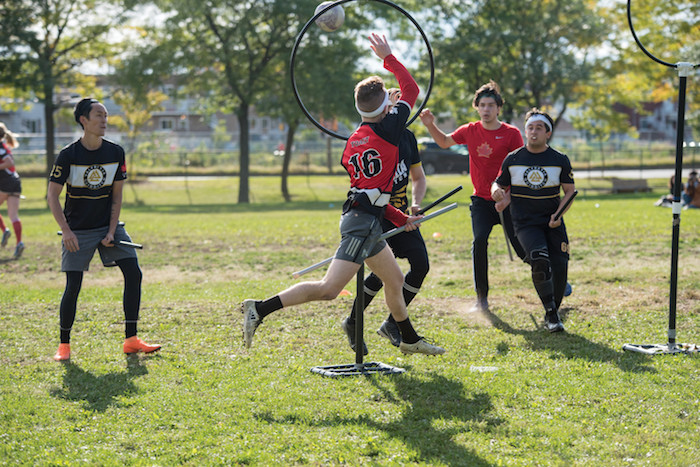On Sept. 29, McGill and Université de Montreal co-hosted the annual season-opening Vive le Quidditch Libre tournament in Montreal’s Parc Villeray. It was a less-than-ideal start to the year for McGill’s two quidditch teams: McA and Canada’s Finest Quidditch Club (CFQC) placed fifth and seventh, respectively, in a pool of seven teams. Nevertheless, the McGill teams remain optimistic about the rest of their seasons.
Quidditch, the brainchild of Harry Potter author J.K. Rowling, is a fictional sport that is popular within the wizarding world of her bestselling series. Each team fields a side of seven players. They fly around the pitch on broomsticks, throwing a ball, or ‘quaffle’, through a set of giant rings to score points. They also try to avoid being hit by smaller, rock-hard balls called ‘bludgers.’ One member on each team, known as a ‘seeker,’ chases a small, golden ball called a ‘snitch.’ The game ends immediately once the snitch has been caught.
Within the past decade, this fictional hobby has become a reality: Groups across the globe have organized quidditch leagues, and the real-world game has adopted its own unique charm. This version, however, does not involve any flying. Instead, players run with narrow pipes between their legs, and the golden snitch is a specially-trained person dressed in gold with a tennis ball hanging from their pants, paid $10 per game to avoid getting caught by seekers. The players known as ‘beaters’ run around and pelt their opponents with dodgeballs instead of bludgers.
“I think people take it as a joke sport and just kind of laugh,” McGill Quidditch Team Captain Caitlin Belz said. “I consider quidditch to be just as much of a strategic and athletic sport as any other.”
This season is a special one for McGill Quidditch, as it celebrates its 10th anniversary. As far as university quidditch is concerned, McGill is a pioneer. Ever since Canada’s first official club was first formed on campus, the sport’s popularity has spiked.
“We started by playing in the U.S., and then there was a Canadian league,” McGill Quidditch VP Communications Brooklynn Carey said.
In fact, the game has grown beyond the university level; two of the teams participating in this tournament were made up entirely of alumni who wanted to stay in the sport.
Participants don’t have to be fans of Harry Potter to get into the sport.
“Not as many people as you would think are fans,” Belz said. “The ratio of fans to non-fans is about 65-35, but we always have a few people on the team that have never read the books or seen the movies, and that number is increasing.”
Around 150 people participated in tryouts this season. Two big pulls for the sport are that quidditch is gender-inclusive, one of very few played at the university level, and that it provides exercise without requiring much athleticism. Often, varsity athletes will play quidditch in the offseason to stay in shape. One such athlete is Ashley Blackburn Ouellette, a former hockey player who got into quidditch after finding the club on campus.
“For an athlete, it [is] a really great sport,” Ouellette said. “I actually fell in love with the sport really fast.”
Though the opening tournament was a bit of a disappointment for McGill Quidditch fans, the season is still young. With such an important anniversary to honour, hopefully McGill Quidditch can make this season a magical one.
A previous version of this article stated that Brooklynn Carey was the VP Internal of the McGill Quidditch team. In fact, she is the VP Communications. The Tribune regrets this error.








